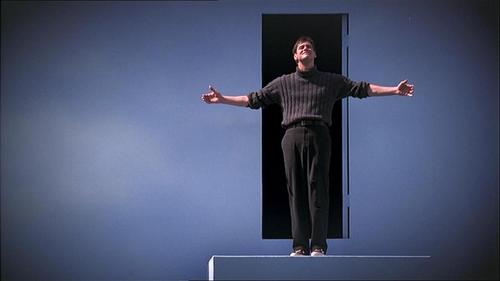It was a memorable moment in movie history when Jim Carey, playing Truman Burbank, opened the door to the outside world for the first time and just before exiting the stage of The Truman Show recited his catch phrase – “In case I don’t see you… good afternoon, good evening and good night.”
The 1998 film depicts a nightmare scenario of employee surveillance. Truman, the employee, not only has his every waking (and sleeping) moment broadcast live to the world, but he isn’t even aware of it. Born into the gigantic, camera-laden set Truman doesn’t discover that his employer has been violating his privacy in every way imaginable until he is 30 years old. Until that point, he didn’t even know he was an employee.
The culture of exploitation and oppression displayed by the cast and crew that create Truman’s world and broadcast it are beyond Orwellian. It’s what makes us root for Truman’s freedom and therefore, the doom of his employer. Real-world workplace surveillance might not come anywhere near this level of invasion, but with electronic communication making everything more traceable and the line between work life and personal life blurring, employers must consider their own culture in the context of employee privacy rights.
That’s the message of Rob Weir, a partner with Borden Ladner Gervais in the labour and employment division. He says that when it comes to the legal determination of how far employers can go in watching their employees, it’s far from clear.
“Don’t worry about the nuances of the law,” he advises. “Have clear policies and tell your employees what you’re doing and when you might search their accounts.”

Truman Burbank never had a private moment in this 1998 movie.
The Supreme Court of Canada made a ruling Oct. 19, 2012 that touched upon employee’s right to privacy in the workplace in regards to computers provided by an employer. A high school teacher using a school-provided laptop was charged after a computer technician discovered nude photos of a female student while doing some routine maintenance. The school turned over the images and the PC to the police, who charged the man later.
The Supreme Court ruled that the teacher still had some expectation of privacy and a warrant should have been used to investigate the data on the school’s laptop. But what right employers have to monitor the computers issued to employees was not addressed by the judge, who specifically said he would “leave it for another day.”
That doesn’t mean that employers don’t have to consider liability issues when it comes to monitoring employee’s IT equipment, Weir says. In Alberta, B.C., and Quebec, the provincial Personal Information Protection Act governs when it’s appropriate for employee’s personal information to be accessed. Those rules must be followed, he says.
There’s also been a civil case over the invasion of privacy that involved the Ontario Court of Appeals. In that case, one bank employee was snooping on account information of another one after a workplace grudge got out of control. That precedent could be applied to employers that randomly inspect an employee’s activities, even on a work computer.
“It hasn’t happened yet, but in theory it’s possible,” Weir says.
Cyber-stalking creepy, not illegal
So what is fair game for employers? Trolling social media for things your employees are saying has proven safe so far. In cases where employees are terminated as a result of posting scathing comments about their boss to Facebook, arbiters haven’t taken into consideration what the privacy settings were on that account – the firing is deemed justifiable.
“The same conversation in a bar goes nowhere. It stays in the bar and people go home, and it’s easily deniable if someone reports it,” Weir says. “But the Facebook post lasts forever and it’s easy to see what you said word for word.”
Legal ambiguities and the temptations of social stalking aside, Weir advises that businesses think about the workplace culture they’re creating with employee surveillance schemes. Whether it’s even worth the time of employers to be scouring Facebook for negative posts or checking to see if an employee is doing some personal banking while at work is questionable at best.
“Do you really want a culture where you’re randomly monitoring your employees email and hoping to find something disgusting or illegal?” Weir asks. “My answer is no.”
Be up front about the surveillance policies you do have in place so employees aren’t surprised by inspections in certain situations, he advises. A workplace dispute or other reasonable grounds could lead to inspection of an employee computer that is well within the rights of the employer.
But if employees feel they are being randomly targeted, then they might feel just a little bit like Truman when his world came crashing down around him. Like that cheerful protagonist, it may not be long before employees tire of feeling watched and instead bid you “good afternoon, good evening, and good night.”




 Brian Jackson is the Editor at ITBusiness.ca. E-mail him at
Brian Jackson is the Editor at ITBusiness.ca. E-mail him at 